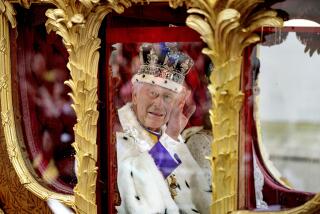British Racism Can Be a Royal Pain
- Share via
There are some stories you couldn’t make up. And there are others that you wouldn’t want to make up. The tale of the racially offensive British royal in the fashionable New York eatery falls under both categories, and it is a shocking introduction to how race and class play out in Britain and how poorly they travel across the Atlantic.
According to a group of black New Yorkers, on Monday night the Princess Michael of Kent turned to their noisy table and chided them: “You need to go back to the colonies.” A spokesman for the princess -- who is the wife of Queen Elizabeth’s first cousin, Prince Michael of Kent -- on Wednesday said: “She did not make a racist comment.”
As far as the princess is concerned, this is probably true. For the most part, the British upper class would not recognize a racist statement if it ran up and stuck a burning cross on their lawns. Prince Philip once referred to the “slitty eyes” of the Chinese and commented that a fuse box bursting with wires looked “as if it was put in by an Indian.” The late Queen Mother lamented that former apartheid leader P.W. Botha got bad press.
When Nicole Young, one of the young black New Yorkers in question, challenged the princess afterward, the royal elaborated on her insult. Relating the exchange to the British wire service, the Press Assn., Young said she told the princess: “ ‘What you said to us before was completely disgusting, despicable and out of line.’ She looked up at me and said, ‘I didn’t say go back to the colonies, I said, ‘Remember the colonies.’
“And I’m, like, ‘Remember what about the colonies?’
“She said, ‘In the days of the colonies there were rules that were very good.’
“And I said, ‘What rules in particular are you referring to?’
“She goes, ‘Just think about it.’ ”
Just think about it. A German-born British aristocrat -- whose father was in the Nazi SS -- in the United States telling African Americans who have been here for centuries to “remember the colonies”?
As someone whose parents came from the colonies (Barbados) to settle in Britain, where I was born and raised, the remarks sadly sound familiar. In the narrative of British history, the emigration of white people to conquer and plunder the world was considered part of the natural order of things. But when the empire struck back with immigration to Britain, our parents were met with great hostility.
“Go back to where you came from” was a remark I often faced growing up. “We are here because you were there” is a response I learned only later in life.
So Princess Michael’s comments are entirely consistent with the mind-set of a nation and a class that has been marinating in post-colonial nostalgia for half a century too long. To be of nobility is to be born with a sense of entitlement that you will be at home anywhere you choose and any black person in your presence is, by definition, abroad.
In Britain, a country where nonwhite people have arrived in large numbers only since World War II and now make up about 10% of the population, this translates into a constant challenge to black peoples’ very right to exist in the nation of our birth. It is this form of bigotry, which makes a distinction between race and place, rather than racism per se, that Americans find so baffling.
When I told one upper-class gent I was born in Hitchin, just outside London, he persisted. “What about before then?” he asked. “Well, there was no before then,” I said. Where are your parents from?” he asked. “Barbados,” I said. “Oh, so you’re from Barbados,” he replied, satisfied.
There is a straightforward explanation for why British blue bloods and black people rarely mix and often clash when they do. The British monarchy is one of the most outrageous and long-standing affirmative-action rackets for wealthy Caucasians. They are among the few people in the world who will openly admit that they owe their livelihood not to what they can do but to whom they were born or married.
Being royal is about knowing your place. Which is always on top. Even if you’re abroad. And especially when dealing with restless, rowdy natives.
More to Read
Sign up for Essential California
The most important California stories and recommendations in your inbox every morning.
You may occasionally receive promotional content from the Los Angeles Times.










